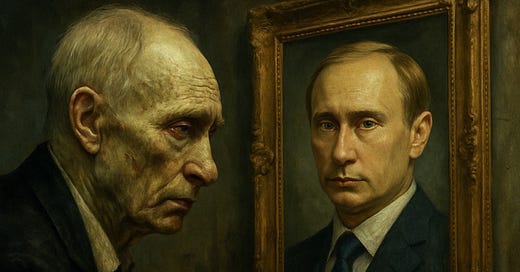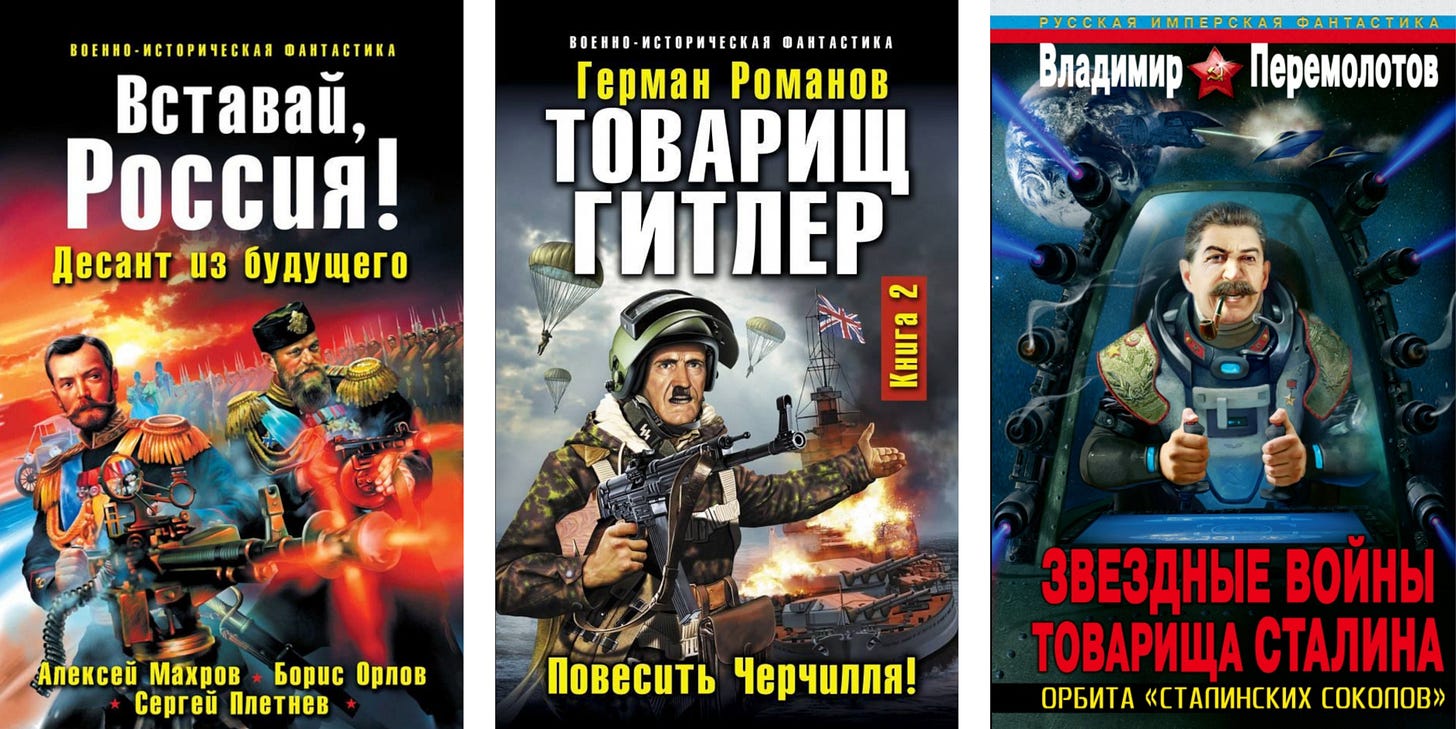Today, I’m starting publishing an essay of mine, “Putin’s Genocidal Quest for Symbolic Immortality”, divided into six parts due to length. Today’s part is Introduction.
As Vladimir Putin started to strengthen his grip on power in the beginning of the 2000s, by subduing defiant businessmen, coercing independent voices into silence, and taming political opposition, a curious development started to take shape in the world of Russian speculative fiction. Fascination with interstellar wars, vampire sagas, and fantasy worlds of elves and orcs increasingly gave way to the intoxication with alternative history and, specifically, with its Russian subgenre of popadanstvo.1
This awkward Russian neologism is derived from the verb popadat’ which can be translated as “to find oneself (somewhere/somewhen)”. A typical popadanstvo novel is centred on a Russian protagonist (popadanets, singular, and popadantsy, plural) who is transferred to, or finds themselves in, a different time and/or space. The closest meaning of the phrases in English would be “accidental travel” for popadanstvo, and “accidental historical tourists” for popadantsy.
As alternative history, popadanstvo is hardly new: already in 1889, Mark Twain published a novel A Connecticut Yankee in King Arthur’s Court, which is considered to be the first fiction work in this genre. Where, however, Russian popadanstvo stands in stark contrast to all other forms of alternative history fiction is its preoccupation with protagonists using their adventure to be of benefit to the Russian state.
Three historical periods are especially popular with Russian authors: Kyivan Rus, the Russian Empire, and the Soviet Union. Protagonists are transferred to those times or have their minds transferred into bodies of prominent people of those periods, and – as they are armed with historical knowledge – they help avoid tragic developments in Russian history or defeat Russian enemies. Thus, hordes of fictional Russian commandos, re-enactors, and even ordinary people travel to the Russian past on the pages of “accidental travel” novels to fight against Turkic nomadic invaders, Napoleon’s army, Third Reich, and other calamities. But sometimes, historical personalities are transferred to the future, and in one of the novels, Soviet dictator Joseph Stalin’s agents travel to contemporary Russia to provide advice to Putin on how to defeat the West and internal enemies.
The surge of alternative history fiction in Russia can be seen as a psychological response to a profound crisis of collective identity. This crisis was born from the disintegration of the Soviet Union, the grinding poverty of the 1990s, and the bitter humiliation of military defeat in the First Chechen War. In weaving tales of personal and national triumph, the fiction industry did more than offer escapism – it tapped into, and perhaps even deepened, a pervasive sense of collective inferiority and the ache of historical disempowerment.
In his writings on myth and ritual, Mircea Eliade argued that by immersing themselves in adventure literature and identifying with fictional heroes on transformative quests, young readers experienced a secular form of rite of passage from adolescence to adulthood.2 Likewise, popadanstvo literature provided Russian readers with illusory compensation for a wounded national self-concept, nurturing patterns of escapism and externalised blame, and subtly transforming its audience into popadantsy themselves.
One infamous real-world popadanets is Igor Girkin (“Strelkov”), a retired officer of Russia’s Federal Security Service (or FSB), who played a key role in the 2014 Russian invasion of eastern Ukraine. A devoted fan of historical literature, Girkin was deeply involved in military re-enactments prior to the invasion of Ukraine. He had a particular fascination with the Russian Civil War, often donning a White Guard officer’s uniform to “act out long-ago battles” against the Bolsheviks – though occasionally, he switched sides – alongside a circle of like-minded enthusiasts.
For Girkin, the Russian invasion of Ukraine became a real-life portal – a chance to find himself in the “future” as “a White Guard officer”, fighting to help contemporary Russia restore the empire lost when the Bolsheviks seized power. By taking part in the 2014 war against Ukraine, he attempted to reverse what he saw as a national catastrophe that had befallen his fatherland in “his” 1917, a past he felt deeply connected to through historical re-enactment.
Although different from Girkin in stature and influence, Putin too can be seen, in a sense, as a popadanets. For Girkin, the pivotal rupture in need of repair was the collapse of the Russian Empire. For Putin, there are two overlapping wounds in the fabric of history. The first is the West’s victory in the Cold War – a triumph that shattered the socialist bloc and hastened the Soviet Union’s fall. The second is Ukraine’s assertion of its own national selfhood, its departure from the gravitational pull of the so-called “Russian world”.
Putin’s war – both against the West more broadly and Ukraine specifically – thus emerges as an attempt to “correct” history, to forge a present in which these ruptures no longer define the historical landscape. In other words, it is a war of “alternative history” – a war to undo the West’s triumph and to erase Ukraine as a nation distinct from Russia.
Continue reading: Part Two, “Moscow is silent”
See the discussion of Russian popadanstvo in Eliot Borenstein, Unstuck in Time: On the Post-Soviet Uncanny (New York: Cornell University Press, 2024).
See, for example, Mircea Eliade, The Sacred and the Profane: The Nature of Religion (New York: Harper & Brothers, 1961); idem, Myth and Reality (New York: Harper & Row, 1963).




